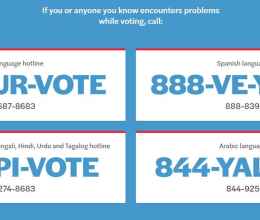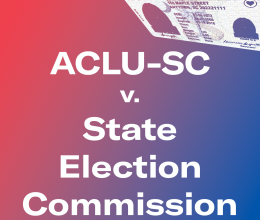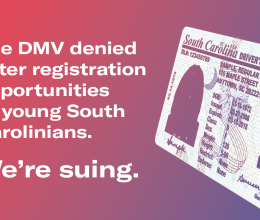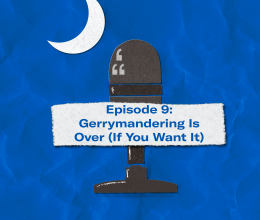
August 1, 2013. Charleston, SC. Post & Courier. By Joanne Day and Victoria Middleton. We write to correct inaccuracies in the July 26 story “States voting rights challenged.”
First, and to paraphrase noted constitutional lawyer Armand Derfner in this paper two years ago, “States don’t have [voting] rights, people do.”
Our right to vote is the one constitutional right that guarantees all others and gives all eligible Americans the power to express their views on how we are governed. States with a history of discriminating against voters and suppressing their right to vote, including South Carolina, have been required, under the Voting Rights Act (VRA), to submit all changes to voting laws to the federal government to ensure that such discrimination does not recur. The VRA was reauthorized by an overwhelming majority in Congress in 2006. In 2011, it protected South Carolina voters when the state ratified its photo ID law. A three-judge panel for U.S. District Court for the District of Columbia heard hours of testimony about the law’s potential impact on the many South Carolina registered voters who lack photo ID.
Your story reported U.S. Attorney General Eric Holder stating that “the Voting Rights Act prompted South Carolina to change the way its new voting statute would be implemented in future elections to eliminate what would have been dramatic discriminatory effect.” But according to S.C. Attorney General Alan Wilson, “The court in no way changed the substance of South Carolina’s Voter ID law, and upheld the law based upon the ‘reasonable impediment’ provision adopted by the legislature.” AG Wilson’s assertion that AG Holder’s interpretation of the federal court’s action was “categorically wrong” does not correspond to our recollection or the court’s ruling.
Let’s be clear: The law that was pre-cleared by the court for elections beginning in 2013 differs substantially from the measure signed by Gov. Nikki Haley. In order to get the law pre-cleared under Section 5 of the VRA, the state agreed to be bound by an expansive interpretation of the “reasonable impediment” provision.
South Carolina’s new law does not require a voter to possess a photo ID to vote. The law allows anyone without a photo ID to vote on a paper ballot by simply stating the reason they did not get their photo ID. Even though the statute requires that such a voter sign an affidavit, the state assured the court that the statement could be witnessed by any poll workers and did not require the availability of a notary public.
According to the ruling, the individual voter — not the poll manager or county commission — determines the reasonableness of the excuse for not possessing a photo ID. So long as the reason given by the voter is not a lie, an individual voter may express any one of many reasons why he or she has not obtained a photo ID. Any voter stating a reasonable impediment casts a special provisional ballot that must be counted unless there is evidence of falsity.
Our legal challenge to South Carolina’s photo ID law was a successful application of the preclearance requirement that demonstrated the VRA’s potency in protecting minority voters and the courts’ flexibility and restraint in applying Section 5 to covered states. As Congress recognized in 2006 when it reenacted the preclearance requirement, strong federal law remains necessary to ensure that Americans can exercise the right to vote free from racial discrimination. Unfortunately, in June 2013, in a huge blow to democracy, the U.S. Supreme Court struck down the coverage formula used in Section 4 of the VRA.
In an interview with The Washington Post (July 26, 2013), Supreme Court Justice Ruth Bader Ginsberg said: “The notion that because the Voting Rights Act had been so tremendously effective we had to stop it didn’t make any sense to me.” Ginsburg said in her dissent that discarding the law was “like throwing away your umbrella in a rainstorm because you are not getting wet.”
What was crucial about the VRA before the high court ruling was that it blocked discriminatory voting laws before they went into effect. Outside of the voting context, most anti-discrimination laws operate after discrimination has occurred — say, if your employer pays you less because you’re a woman or you’re gay, you often sue afterward, and then, if you prove your case, you get awarded back pay.
That kind of process doesn’t work in the elections context — there are no election do-overs. This is why it is so vital to prevent discriminatory voting laws before they are implemented. Since the Supreme Court’s decision, voters who suffer discrimination will generally only be able to sue after their rights have been infringed — and, even if they prove their case, we all will still have to live with the results of an unfair and unlawful election.
The VRA protected the voting rights of hundreds of thousands of South Carolinians and in doing so protected the very foundation of our great democracy. In its decision, the Supreme Court left open a path for Congress to rework and restore the VRA. We call on Congress, voting rights advocates and state and local government officials to do all in their power to protect our democracy and the right to vote.
JoAnne Day is co-president of the League of Women Voters of South Carolina. Victoria Middleton is executive director of the ACLU of South Carolina.






